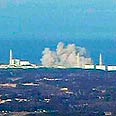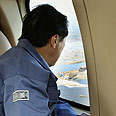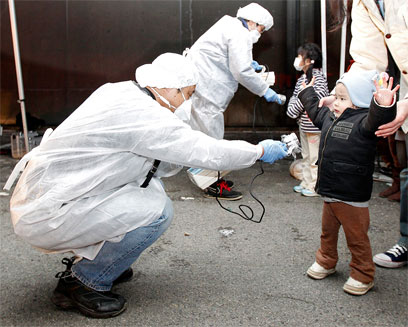


Radiation leaked from a crippled nuclear plant in tsunami-ravaged northeastern Japan after a third reactor was rocked by an explosion Tuesday and a fourth caught fire in a dramatic escalation of the 4-day-old catastrophe. The government warned anyone nearby to stay indoors to avoid exposure.
Radiation levels in the city of Maebashi, 100 km (60 miles) north of the capital, Tokyo, were up to 10 times normal on Tuesday, Kyodo news agency said, quoting the city government.
Officials have detected slightly higher-than-normal radiation levels in Tokyo but insist there are no health dangers.
Takayuki Fujiki, a Tokyo government official says: "The amount is extremely small, and it does not raise health concerns. It will not affect us."
In a nationally televised statement, Prime Minister Naoto Kan said radiation has spread from four reactors of the Fukushima Dai-ichi nuclear plant in Fukushima province, one of the hardest-hit in Friday's 9.0-magnitude earthquake and the ensuing tsunami that has killed more than 10,000 people.
"The level seems very high, and there is still a very high risk of more radiation coming out," Kan said. "We are making utmost efforts to prevent further explosions and radiation leaks."
The International Atomic Energy Agency (IAEA), citing information it had received from Japanese authorities, said dose rates of up to 400 millisievert per hour have been reported at the Fukushima power plant site.
"The Japanese authorities are saying that there is a possibility that the fire was caused by a hydrogen explosion," it said in a statement.
This is the worst nuclear crisis Japan has faced since the atomic bombing of Hiroshima and Nagasaki during World War II. It is also the first time that such a grave nuclear threat has been raised in the world since a nuclear power plant in Chernobyl, Russia exploded in 1986.
Kan warned there are dangers of more leaks and told people living within 19 miles (30 kilometers) of the Fukushima Dai-ichi complex to stay indoors to avoid radiation sickness. Some 180,000 people had already been evacuated from a 12-mile (20-kilometer) radius and it was not immediately clear how many people live in the outer radius for which the new warning was issued.
Three reactors at the power plant were in critical condition after Friday's quake, losing their ability to cool down and releasing some radiation. A fourth reactor that was unoperational caught fire on Tuesday and more radiation was released, Chief Cabinet Secretary Yukio Edano said.
The fire was put out. Even though it was unoperational, the fourth reactor was believed to be the source of the elevated radiation release because of the hydrogen release that triggered the fire.
"It is likely that the level of radiation increased sharply due to a fire at Unit 4," Edano said. "Now we are talking about levels that can damage human health. These are readings taken near the area where we believe the releases are happening. Far away, the levels should be lower," he said.
"Please do not go outside. Please stay indoors. Please close windows and make your homes airtight. Don't turn on ventilators. Please hang on your laundry indoors," he said.

Residents in 19 mile radius ordered to stay indoors (Photo: Reuters)
Officials said 50 workers were still there trying to put water into the reactors to cool them. They say 800 other staff were evacuated. The fires and explosions at the reactors have injured 15 workers and military personnel and exposed up to 190 people to elevated radiation.
Death toll rises
The death toll from last week's earthquake and tsunami jumped Tuesday as police confirmed the number killed had topped 2,400, though that grim news was overshadowed by a deepening nuclear crisis. Officials have said previously that at least 10,000 people may have died in Miyagi province alone.
Hajime Sato, a government official in Iwate prefecture, one of the hardest-hit, said deliveries of supplies were only 10% of what is needed. Body bags and coffins were running so short that the government may turn to foreign funeral homes for help, he said.
In a bid to stop the reactors at the nuclear plant from melting down, engineers have been injecting seawater as a coolant of last resort.
The nuclear crisis has also raised global concerns about the safety of nuclear power at a time when it has seen a resurgence as an alternative to fossil fuels.
The head of the International Atomic Energy Agency said the Japanese government has asked the agency to send experts to help.
The Associated Press and Reuters contributed to this report
- Follow Ynetnews on Facebook















